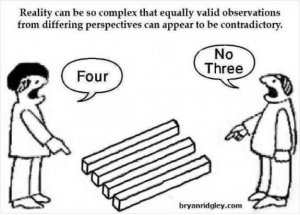Ronni
Well-known Member
- Location
- Nashville TN

It’s a sort of a humorous illustration, but nonetheless is an evocative visual pertaining to what one considers to be real depending on one's own perspective.
I was having a discussion with my daughter a couple days ago. She's struggling with anxiety and panic attacks, and has physical symptoms when she's triggered. She will wake up from a sleep with her heart feeling like it's racing, pounding, even though there has obviously been no exertion, she doesn't really dreaming about anything scary that would elevate her heart rate, and yet it's pounding. It's made her feel crazy. So....she started wearing her apple watch to bed, which actually tracks heartbeat etc., and discovered that YES!! It's not all in her head. Her heart rate does elevate considerably while she's sleeping, for no reason that she can discern.
The point isn't my daughter's anxiety. It's that what she felt was happening to her was actually validated by an external source, in this case her apple watch, and that grounded her. Her reality of what was happening to her was validated.
I find this to be a fascinating subject. It's that age old question: If you're the only one who sees the pink elephant in the middle of the room, is it really there? Most of the time you'd think you were losing your mind if no one else could see it. But if even ONE person saw it too, that would help validate YOUR reality, even if, in fact, there was no actual pink elephant in the middle of the room.
As a general statement, I think society demands some form of common agreement to determine reality. Are UFO's real or not? Are ghosts? Other paranormal activities? For those who believe they are, they have typically formed or become a part of a group or organization, however loose and informal, that believes similarly. It's really hard believing something to be real if no one agrees with you. Having the courage of your convictions is so much easier if you're not alone in them.
During the really bad years of my marriage, when my ex-husband's verbal and emotional abuse had escalated severely, and I was socially isolated, (he'd moved us across the country so I had no friends or family around, save his work associates) it was difficult for me to believe the reality of that abuse. Why? Because everyone we knew socially through his work thought him to be a charming, intelligent, charismatic man, who loved his family. If THEY all thought well of him, how could *I* possibly be right about his abuse...his domination, intimidation, control?
It was only AFTER I accidentally stumbled upon an online group for abused women (I was searching for links about how to be a better wife) that I started to realize that I wasn't alone, that I wasn't crazy, that I wasn't blowing things out of proportion or making mountains out of molehills. My reality was finally validated, that the behavior of my husband towards me was not normal or appropriate when up to that point I had spoken to no-one about his behavior so I had no way to get any agreement that it wasn't right.
Agreement can be a powerful thing. I think we tend to seek agreement in all manner of things, in order to validate our own reality, whether it's in politics (hense the rabid arguments surrounding same...we want others to think as we do so that we can be more firmly grounded in our reality that this is the right choice) or any other hotly debated subject. You will find lots of divisiveness around whether or not covid is real, or the pros and cons of mask wearing, or anything else that is hotly debated. We seek agreement for our views. Sure, not everyone does, but most do, whatever the subject. Because if we have enough agreement to satisfy us, we can then stand firm in our own reality.

